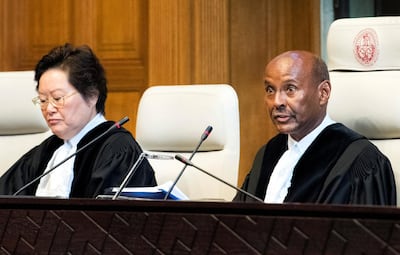Iran on Monday demanded the UN's top court suspend US nuclear-linked sanctions against Tehran, accusing Washington of plotting its "economic strangulation".
"The United States is publicly propagating a policy intended to damage as severely as possible Iran's economy and Iranian nationals and companies," Iranian lawyer Mohsen Mohebi told International Court of Justice in The Hague.
"This policy is nothing but naked economic aggression against my country," he said.
"Iran will put up the strongest resistance to the US economic strangulation, by all peaceful means."
Iran is claiming that President Donald Trump's decision to reimpose sanctions that had been lifted under the 2015 nuclear was a breach of a 1955 treaty with the US. It told the court the measures were already devastating its economy and threatening the welfare of its citizens.
US lawyers are due to give their response in arguments before the court on Tuesday.
The reimposed sanctions have added to Iran's economic woes, helping to fuel strikes and protests from across the country and political spectrum. In the latest blow, Iran's parliament impeached the economy minister, Masoud Karbasian, on Sunday. President Hassan Rouhani, whose labour minister was dismissed by parliament earlier this month, has himself been summoned for questioning on Tuesday.
Iran has called on the other parties to the nuclear deal to resist US pressure to isolate Iran. In a phone call with French President Emmanuel Macron on Monday, Mr Rouhani said Tehran expected the remaining partners to act quickly to preserve the agreement.
"Iran has acted upon all its promises in the nuclear agreement and, with attention to the one-sided withdrawal of America ... expects the remaining partners to operate their programs more quickly and transparently," he was quoted as saying by the Islamic Republic News Agency.
_______________
Read more:
Iran's Rouhani prepares to face angry MPs
Iran's parliament sacks economy minister
US criticises European aid package for Iran
_______________
Sanctions had been lifted under a 2015 multilateral agreement in return for Iran committing not to pursue nuclear weapons. But Mr Trump reimposed unilateral sanctions three weeks ago. He said they were needed to ensure Iran never builds a nuclear bomb and to address its continuing missile programme and support for terrorism.
A second wave of punitive measures are due to hit Iran in early November, targeting its vital energy sector including oil exports.
Tehran filed its case before the ICJ in late July, calling on the tribunal to order the immediate lifting of sanctions pending a definitive ruling.
It said the sanctions would cause it "irreparable prejudice" are in breach of the 1955 Treaty of Amity and Economic Relations between Iran and the United States.
The ICJ is expected to take a couple of months to decide whether to grant Tehran's request for a provisional ruling. A final decision in the case may take years.
The 2015 deal was signed by Iran and the five permanent members of the United Nations Security Council plus Germany.
Mr Trump, who took office last year, called it a "horrible one-sided deal" that "failed to achieve the fundamental objective of blocking all paths to a Iranian nuclear bomb".
Mr Trump pulled out of the deal in May and said he would reinstate sanctions, although the other parties to the deal said they would remain in the agreement.
Tehran says that the new sanctions are already hurting its economy. Iran's currency, the rial, has lost about half of its value since April.
In a court filing at the ICJ, Iran's lawyers said the US sanctions threaten tens of billions of dollars' worth of business deals with foreign companies.
European companies including France's Total, Peugeot and Renault, and Germany's Siemens and Daimler, have suspended operations in Iran after the US withdrew from the nuclear deal.
Air France and British Airways announced last week that they would halt flights to Tehran next month, saying they were not commercially viable. The British carrier added, however, that the decision was unrelated to the fresh sanctions.
Mr Trump said the sanctions would turn up the financial pressure on Tehran to come to a "comprehensive and lasting solution" regarding its activities such as its "ballistic missile programme and its support for terrorism".
Iran's supreme leader Ayatollah Ali Khamenei this month appeared to rule out any immediate prospect of talks, saying "there will be neither war nor negotiations" with the US.
Washington's lawyers will present their case on Tuesday, with a second round of arguments on Wednesday and Thursday. Experts expect the US to challenge the ICJ's jurisdiction.
At the start of the hearings on Monday, the court's president Abdulqawi Yusuf, leading a 15-judge panel, urged the US to respect any provisional decision the court may make.
The ICJ was set up in 1946 to rule in disputes between countries. Although the court's decisions are binding, it does not have the power to enforce them.
The US and Iran have clashed at the court in the past since they became enemies after Iran's 1979 Islamic Revolution. Iran ignored a 1980 US suit at the ICJ over the seizure of American diplomats in Tehran, which the court found to be illegal.The ICJ ruled in 2003 that the US-Iran treaty was still valid even though it was signed before the Islamic revolution, but did not deem US actions against Iranian oil platforms nor Iranian attacks on American shipping to have violated the treaty.
_______________
Read more: Inside Iran's disinformation campaign on the West
_______________



